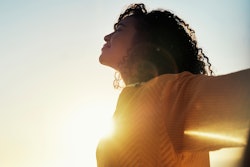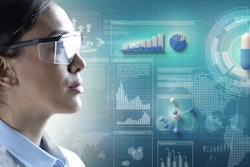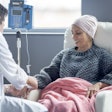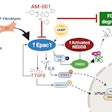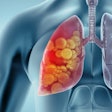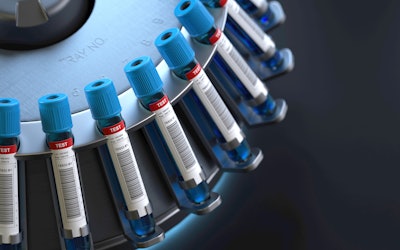
Soon, a simple blood test powered by artificial intelligence (AI) technology could help predict a person’s likelihood for developing lung cancer. A research team from Johns Hopkins Kimmel Cancer Center and several supporting institutions have developed and verified the liquid biopsy with the goal to boost lung cancer screening, diagnose cancer earlier and, ultimately, reduce death rates.
The scientists, who recently published their findings in Cancer Discovery, demonstrated the technology’s reliability to recognize lung cancer predisposition by assessing DNA fragment patterns in the blood. The prospective study enrolled approximately 1,000 patients with and without cancer who met the criteria for standard lung cancer screening that uses low-dose computed tomography (CT). Participants represented 47 centers from 23 states.
“We have a simple blood test that could be done in a doctor’s office that would tell patients whether they have potential signs of lung cancer and should get a follow-up CT scan,” said the study’s corresponding author, Victor E. Velculescu, MD, PhD, who is professor of oncology and co-director of the Cancer Genetics and Epigenetics program at the Johns Hopkins Kimmel Cancer Center.
The U.S. Preventive Services Task Force estimates that about 15 million high-risk individuals should be screened each year, but only 6% to 10% of those who are eligible get screened. Barriers include lack of health care access or knowledge of screening eligibility, as well as exposure to low doses of radiation during the CT scan.
The blood test, which Dr. Velculescu and his colleagues have been working on for the past five years, uses the DNA Evaluation of Fragments for Early Interception (DELFI) approach to help detect lung cancer by analyzing DNA packaging in a patient’s cells. According to the researchers, DNA in healthy cells is orderly and uniform, while DNA in cancer cells is more disorganized.
To verify the test, the researchers programmed the software to recognize the DNA fragmentation patterns in the blood work of 576 patients with and without lung cancer. Then, they corroborated the method by evaluating blood work from an additional 382 patients with and without lung cancer. The team confirmed that the test had a negative predictive value of 99.8%. Out of 1,000 individuals, this means only two might be missed from an early diagnosis.
According to computer simulations, the scientists predict that if the blood test could increase lung cancer screening to 50% in five years, the rate of lung cancer diagnoses would surge by 400% and the proportion of early detection — when lung cancer is most treatable — would increase by almost 10%. This could prevent approximately 14,000 cancer deaths over a five-year span.
“The test is inexpensive and could be done at a very large scale,” Dr. Velculescu said. “We believe it will make lung cancer screening more accessible and help many more people get screened. This will lead to more cancers being detected and treated early.”
Currently, the test is available through DELFI Diagnostics for use as a laboratory-based test under the Clinical Laboratory Improvement Amendments. However, the team announced plans to seek approval from the U.S. Food and Drug Administration (FDA) for lung cancer screening. The researchers also intend to study whether a similar approach would work to detect other types of cancer.






